Thomas E. Ricks's Blog, page 85
October 10, 2013
Army colonel becomes Indian chief

Retired Army Col. Kevin Brown, formerly
garrison commander at Ft. Riley, was elected chairman of the Mohegan tribe, which
is small in numbers but big
in the gambling world.
October 9, 2013
Reading a casualty report: U.S. fighting in Afghanistan as long as they can remember

Reading
this casualty report yesterday (Tuesday),
it occurred to me that we have been fighting in Afghanistan for about as long
as our soldiers there can remember. They were 12, 10, maybe even 7 years old
when the fighting began.
The
four soldiers killed on Sunday west of Kandahar were from a specially
trained team that engages Afghan women, reported Drew Brooks of the Fayetteville Observer. One of them, Lt. Jennifer Moreno, 25, was saluted by
the commander of the 75th Rangers as "a talented member of our team who lost her life while
serving her country in one of the most dangerous environments in the world. Her
bravery and self-sacrifice were in keeping with the highest traditions of the 75th Ranger Regiment."
This
is the first statement I can remember from the Rangers about a female soldier,
but I haven't gone looking closely at their statements, so I might have missed
some.
On
the other hand, I have read every single damn casualty statement released from
the Pentagon for the last 12 years. I am not sure how long I will continue to
do it. But I still feel like I shouldn't stop. Or maybe I can't.
How to deal with pompous sticklers
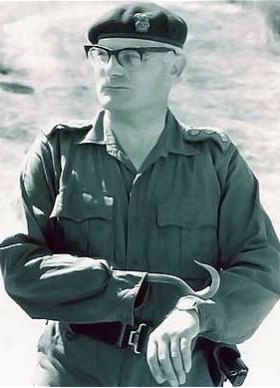
"Pomposity and pretentiousness received very short shrift
from him. When a general, a stickler for punctuality and held in no great
affection, paid an official visit, Cubiss arranged for all the clocks in the
camp to be put forward by five minutes. The great man arrived to find Cubiss, a
picture of exasperation, tapping his watch."
This
is from a good obituary in the Daily
Telegraph of Brig. Malcolm Cubiss.
(HT to down-under
PL)
Tales of the shutdown (III): On civilian faculty, federal furloughs, and quality

By Nicholas Murray
Best Defense guest columnist
I've just read
Professor Bruce Fleming's comments regarding PME during the furlough. I found interesting the similarity of his experience with mine. As we
know, almost all PME civilian employees were deemed non-essential and sent home
(though most have since returned to work). What struck me most was what has
happened to the students' classes after civilian faculty were sent home: Some
of the classes at the U.S. Naval Academy continued, some did not, depending on
whether there was the expertise to continue teaching those subjects. At the Command
and General Staff College, all of the classes continued despite the bulk of
faculty being furloughed. How was it that one institution could seemingly carry on as normal
while another felt it did not have sufficiently qualified faculty to continue,
except in a few areas where the active-duty faculty could effectively cover?
To find out how CGSC
managed this we need to look at what it does. Its main goal is to educate and
develop leaders for joint operations and functions, as called for by the
Goldwater-Nichols Act, and to teach critical and creative thinking in order to
prepare officers for the longer term. As such, classes follow a graduate-school
model of discussion seminars, led by an expert, where the free flow of ideas is
the norm in a small-group seminar setting (one over 16 being the model).
The problem is, last
week these classes were taught in groups as large as one over several hundred.
And by whom, given that the civilian experts were deemed non-essential? But, I
hear, CGSC is not a civilian graduate school, at least according to some, so the normal rules of graduate schooling don't matter.
The thing is, they
do: CGSC is accredited both as a graduate school and for teaching joint
operations. In fact, according to page 9 of CGSC's catalog, the school is a graduate degree granting college
and it legally must maintain accreditation for its classes from the
relevant civilian education authorities. This is true, whether or not all
officers take a degree. Accreditation is important, because it establishes
standards and best practices to ensure that students are getting a decent
quality of education. Thus, accreditation is not simply a bar to get over every
few years: it should be viewed as a pathway to the best education a school can
provide.
Yet, CGSC chose to carry on as
though nothing substantial changed. On the face of it, students continued to
learn and the government got to save a bunch of money. What could be wrong with
that? What does that have to do with accreditation? The answer to both
questions is, more than it seems.
The civilians furloughed from the
PME schools provide the bulk of the subject matter expertise for those
institutions. This is certainly true at CGSC. This fact is important, because
accreditation requires that faculty be qualified to a level higher than the
classes they are teaching. Thus, for graduate classes, that typically means
doctoral degrees are required. Of course, there are some active-duty personnel
teaching in the PME system who possess such a qualification. However, the majority
do not. This is not to question their ability or integrity, but it does raise
an important issue: How can the classes remain accredited if people with the
requisite level of qualifications are not teaching them? Remember, the USNA
closed classes (as did many other PME schools) that did not have the required
level of qualified instructor or expertise. CGSC did not.
There is another piece to this: the
quality of education. Most research on education shows that the level of
knowledge of the instructor closely relates to the learning outcomes of the
student. This means classes at CGSC might well have been running but in all
likelihood student outcomes were not the same; they were lower. Again, clearly
this was recognized by the USNA and other PME schools, but seemingly not by
CGSC.
CGSC's response to the furloughs
was to carry on as though nothing actually changed. This indicates that it is
more interested in appearing good than being good. I would welcome a response
that explains how CGSC maintained the quality of ‘seminars' that went from a
ratio of one instructor to 16 students to as many as one to 200-300 without the
requisite expertise that was deemed necessary only a couple of weeks earlier.
The USNA (and other PME schools) made it clear through their actions that they
care more about the actual quality of the education they provide to the
students than does CGSC. I am led to the inevitable conclusion that CGSC is
more interested in checking the box marked "success," rather than actually
achieving it. This bodes ill for General Cone's vision of CGSC as Harvard on
the Missouri.
Dr. Nicholas
Murray is an associate professor in the Department of Military History at the
U.S. Army Command and Staff College. This year he was awarded the Department of the Army
Commander's Award for Civilian Service, and he was named Educator of the Year
for History. He has previously published "Guess what? CGSC is even more broken than we thought! And it is getting
worse" on Best Defense and "Officer Education: What Lessons Does the French Defeat in 1871 Have for
the US Army Today?" in the Small Wars
Journal. The views are those of the author and do not reflect the official policy
or position of the Department of the Army, Department of Defense, or the U.S. government.
October 8, 2013
What did British naval aviation do in World War II after the Taranto raid?

Yes, there was
the Taranto raid, and Royal Navy aircraft crippling
the Bismarck's rudder about seven months later.
But did British naval aviation have any effect on World War II after
1941? I've been struck at how absent it is from the World War II histories. Of
course, there was the Battle of the Atlantic, which was crucial -- but wasn't
the most effective air work done by long-range RAF flights over the Western Approaches?
The war record is
especially striking when you contrast it to the RAF saving the nation from
possible invasion during the summer of 1940.
It is even more
striking that as late as 1944, the Royal Navy's planners were arguing that the
postwar British fleet should be built around the battleship, according to Eliot
Cohen's Supreme
Command, which I was
re-reading this summer.
Today's essay
question: Was the RAF more adaptive than the air wing of the Royal Navy? If so,
why? Extra credit for good historical examples, double points for class
antagonism.
The USMC crackdown on barracks life may in fact exacerbate the trouble

By
"Rick"
NFI
Best Defense department of Marine culture,
because the Marines have culture instead of doctrine
Many
current and former Marines, as well as others, may be aware of the commandant
calling for a crackdown on rowdy behavior in the barracks and his desire to institute new measures in the barracks across
the Corps to "reawaken it morally and crack down on behavioral problems that are
leading to Marines hurting themselves, their fellow Marines, civilians, and
damaging the Corps' reputation."
In addition, the
commandant further cited problems of sexual assault,
hazing, drunken driving, fraternization, as well as the failure to maintain
personal appearance standards among the issues he wants fixed (speaking of
personal appearance, fortunately the current commandant wasn't around in my day
to see my platoon come back aboard ship after trading various parts of uniforms
with the Royal Thai Marines ... yea, I got a belt).
Do I,
as someone that served through similar events (possibly worse) after the early
post Vietnam wind-down, view what the commandant is requiring as too draconian
and an overreaction to Marines settling into garrison after many years on a
high-energy war tempo? I say not necessarily, because without a doubt the
safety of our men and women in uniform is of the utmost importance, as adhering
to high standards of conduct is a Corps tradition and is surprisingly expected
by the public. But rather than dwell on the trivial, such as having personnel
on duty wear an appropriate seasonal dress uniform, which is nothing new but
rather a return to bygone days when this was normal practice, let me address a
primary concern.
Let me
remind all what makes the U.S. military, let alone the Corps, different than
many of the world's militaries: It is our cadre of NCOs/petty officers that we
ideally empower with trust and confidence to carry out duties and missions
normally found performed by officers in foreign militaries. Therefore, when the
commandant states that corporals and sergeants will no longer be promoted as a group,
but individually, giving promotion a personal nature and meaning, that can only
be a good thing and something that was done when I was promoted to those ranks
prior to Vietnam.
However,
if the Corps is going to talk-the-talk about NCOs being the backbone of the
Corps, then it must walk-the-walk and allow its NCOs to supervise what goes on
within the bounds of their authority among the rank and file, holding them
accountable and correcting where necessary, while certainly making available
24/7 both staff non-commissioned and commissioned officers to assist and/or
take over in resolving matters beyond their NCOs' experience level and/or
authority when required, as well as pointing NCOs in the direction to arrive at
the correct solution as opposed to doing it for them.
Unfortunately
in my view, the commandant, by introducing security cameras in the barracks and
having the barracks roamed by seniors beyond the normal staff duty and officer
of the day routinely after hours, can create a climate that the Corps doesn't
trust its corporals and sergeants to maintain authority along with good order
and discipline. Odd, in a manner of thinking, since many have been carrying
loaded weapons around 24/7, supervising other doing the same thing, among other
things. Thus, I would recommend local commanders who know their Marines are the
best informed to make decisions on how much further supervision, along with
"health and comfort" inspections, are necessary within their command/unit.
Although, it might not hurt to have a junior officer available after hours and
on weekends periodically that is approachable for informal chats after hours,
which is something I took upon myself to do once upon a time during the dark
days immediately following our withdrawal from Vietnam.
In
closing, I would caution that some further discussion take place in regard to
what is and isn't necessary involving supervision, and would point out not
using measures tantamount to spying and micromanagement. Because nothing drives
young Marines crazier than boring, unimaginative garrison training and assigning
make-busy tasks than superiors popping in and out of the barracks at all odd
hours, displaying a lack of trust that may lead many living in the barracks to
find homesteads elsewhere after sunset, under less ideal conditions, contributing
to the very problems the commandant is trying to get under control.
"Rick" NFI is
a retired
Marine interested in seeing the spirit of Lt. Gen. John A. LeJeune's belief
that the relationship between senior and subordinate should be one of mutual
trust, within the framework of a father mentoring and guiding a son (or
daughter) without hovering over him (or her).
'Fire and Forget': A review
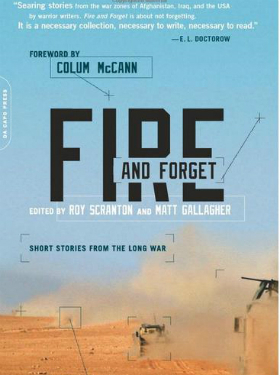
Reviewed
by Brian Castner
Best
Defense book reviewer
A
version of this review first appeared in the August issue of Proceedings
of the U.S. Naval Institute.
If you believe the media coverage and
commentary, all of America is still waiting for the great fiction of the wars
in Iraq and Afghanistan. Many of last year's reviews of The Yellow Birds or Fobbit
or Billy Lynn's Long Halftime Walk
noted the supposed dearth of war novels to that point. In times past, America
waited 11 years for A Farewell to Arms,
16 for Catch-22, and 15 for The Things They Carried. Now our culture
wants to hear who won American Idol
by the end of the episode, and even Anthony Swofford, who knows something about
delayed gratification (his memoir, Jarhead,
was published 12 years after the first Gulf War), says on the back cover of Fire
and Forget, the new collection of short stories by military veteran
writers, "I've been waiting for this book for a decade."
Is the wait finally over? Yes, according to
Matt Gallagher, one of the collection's editors, who was impatient himself; he
wrote a piece for The Atlantic in
2011 asking when a great novel from the long wars would finally be written.
"Iraq and Afghanistan fiction is in a much
better place than it was when I wrote that article," he told me, before
hedging, "It's just beginning. There's no one dominant story, no one clean
narrative, to emerge from these postmodern, brushfire wars. There are many."
The form of Fire
and Forget follows its function, then: 15 tales with varied perspectives,
and while expected themes of struggle and disillusionment emerge, there is not
a carbon copy to be found here. If you are a fan of literary Paris Review or The New Yorker short stories -- casual tragedy, slow reveals,
ambiguous endings -- you will find familiar hardware in this collection, and
for good reason. These are serious writers, more than half graduates of
master's of fine arts programs, but unlike the traditional college student,
these veterans bring a life experience to the form that is substantial and
heart-breaking.
Perhaps fittingly, considering the
post-traumatic stress disorder newspaper headlines, there are more stories here
about the challenges of return than the horrors of war, more whiskey bottles
flying than bullets. In a number of stories about surreal post-war moments,
animals act as symbolic stand-ins for innocence, and thus are mercilessly shot,
squashed, and buried. For me, the stories of in-country combat were a
comparative relief from the grinding tales of heartache at home. At least we
know how the firefight will end; we have no such certainty about those still
laboring to reintegrate.
The winner for sheer visceral impact is Phil
Klay, whose story of returning is so spot-on I wonder if he wrote it while
still on the plane ride home. He gets everything pitch perfect, and not just
the major points, such as wanting to go back to war right away, literally hours
after landing. No, it was the small truths that returned me to my own
homecoming: the unfamiliar softness of a wife's embrace after months of hard
Humvees, the pleasant satisfaction of the first hangover. Klay remembers the
details so the rest of us don't have to.
David Abrams, the author of Fobbit, tells the brutal story of a unit
remembering fellow soldiers lost in combat, not with nostalgia but rather
obscenity-laced efficiency. "This short story is more typical of what I
normally write," Abrams told me. "It has more dramatic punch than . . . comedy veneer."
Siobhan Fallon's excellent story from the
perspective of an Army wife is a breath of fresh air, one that comes early in
the anthology and that honestly I could have used a little later. The veteran
experience can feel insulated and claustrophobic, and Fallon's incongruence
with the other pieces -- the only one not from the perspective of the solider
or veteran (although Gallagher's contribution is half and half) -- begs the
question, where is a piece about an Afghan family? An Iraqi interpreter? A new
refugee? Instead, the Iraqis and Afghans in Fire
and Forget are always "hajjis" or, in the words of contributor Ted Janis's
protagonist, "[expletive] traitors."
Why is this? "I think veterans are still stuck
in their own head," said Abrams. "And I think we Americans, to paint with a
very broad brush, lead very insular lives. We don't naturally think about
foreign policy. But for the purposes of this anthology, it's fine. Each of
these works of art stand on their own."
True, and they do so well, but even the story
from Andrew Slater, now a teacher of English at the American University in
Erbil in northern Iraq, is about a U.S. soldier struggling with traumatic brain
injury at home. Would he not have been the writer to bridge the gap? His story,
though, is so troubling and thought-provoking that I wouldn't trade it and
that's the point, isn't it? After 12 years of war, we're just starting to
understand what happened to our own soldiers. Perhaps in time we'll reach
across the gulf to those we were fighting -- with and against.
Brian
Castner is a former U.S. Air Force captain and explosive ordnance disposal
officer. He is the author of The
Long Walk: A Story of War and the Life That Follows (Doubleday, 2012). This review is reproduced here with the permission of its author.
October 7, 2013
What the hell is Gen. Clapper thinking, saying that furloughs may encourage intelligence officials to sell secrets?
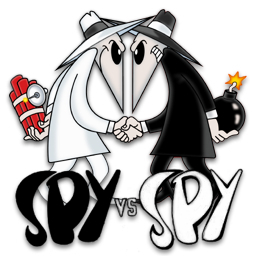
By "Sto Akron
"
Best Defense bureau of intelligence review
On October 2nd, in testimony before the Senate Judiciary Committee less than 48
hours after the government shutdown began, Director of National
Intelligence Clapper characterized the furlough of thousands of members of the intelligence community
as a "dreamland for foreign intelligence service to recruit,
particularly as our employees, already many of whom [are] subject to furloughs
driven by sequestration, are going to have, I believe, even greater financial
challenges."
Mr. Clapper, the very idea that after two days or two-hundred
the dedicated men and women of the intelligence community would be more
inclined to become traitors and commit espionage lays bare your lack
of appreciation for the deep sense of patriotism, pride, and commitment to
national security that drives them. Those of us who have served alongside them
know that they would turn to the private sector, or even the local unemployment
office, before ever knocking on the door of the Russian Embassy.
More worrisome, perhaps, is the fact that it highlights your
fundamental misunderstanding of what leads people to commit treason. While
there have been and always will be prospective spies that make it
through the screening process, the vast architecture you
currently oversee is not filled with would-be Edward Snowdens. Anyone who has
worked in the intelligence field will tell you that spotting, assessing,
developing, and recruiting human sources is a rigorous and relentless
process -- even in countries that are in far worse shape than ours.
So, while it is certainly easy to follow your logic -- that
furloughed American workers are easier targets because they suddenly don't have
a regular paycheck or even a job -- it is difficult to imagine
intelligence professionals rushing out to do the unthinkable as the
United States becomes a "dreamland for foreign intelligence
services."
Most Americans are concerned about their own job
security and the precarious state of the economic recovery. What's more,
they understand the importance of the intelligence community and that
sending a good part of it home is bound to have an impact on national security.
But the last thing they need to hear from the director of national intelligence is
a sensational call to get his people back to work lest
they sell off the rest of the family jewels.
Mr. Clapper, in your testimony you also said, "I've
been in the intelligence business for about 50 years. I've never seen
anything like this." Well, as that 50-year period covers most of
the Cold War and the entire span of the ongoing global war on terror, I
think most would agree that there have been dozens of times more harrowing
and uncertain than the past 48 hours. Truth be told, at a time
when the entire country is disgusted with the partisanship that has run the
federal government into the ground, your comments do little to
resolve deepening concerns about the current state of leadership in this
country.
"Sto Akron" is a former case officer of the
CIA's National Clandestine Service.
And what the hell is Gen. Hayden doing, joking about killing Edward Snowden?
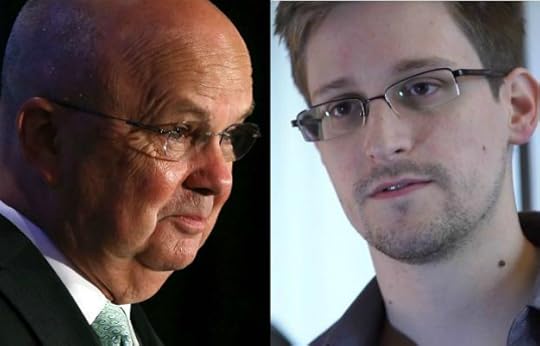
Not funny. And poor
judgment to say it in public.
More broadly, the
comment seems to reflect an atmosphere of lawlessness in the U.S. intelligence
community nowadays, that legal is what their lawyers say is legal.
And in recent years,
more intelligence officials have gone to jail for leaking than for torturing.
That's some sick shit.
Story of the day: A bereaved mother sees the memoirs of Pres. Bush in a store...
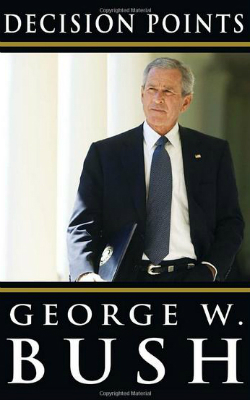
"Gold Star Father,"
a Marine vet who lost a Marine son in our recent wars, mentioned this in a comment the other day:
I was tootling around a Big Box Store one day with my
wife. I left the book section and moved on. Wife disappeared. I back tracked to
find her at the book section taking all of Bush's memoir copies off the shelf
and dropping them on the floor. I panicked for a second as I figured
every camera in the store probably just targeted us. But, I kinda shrugged,
watched her do it, and we moved on. She told me she did the same when Rummy's
memoir hit the shelves.
Thomas E. Ricks's Blog
- Thomas E. Ricks's profile
- 436 followers



